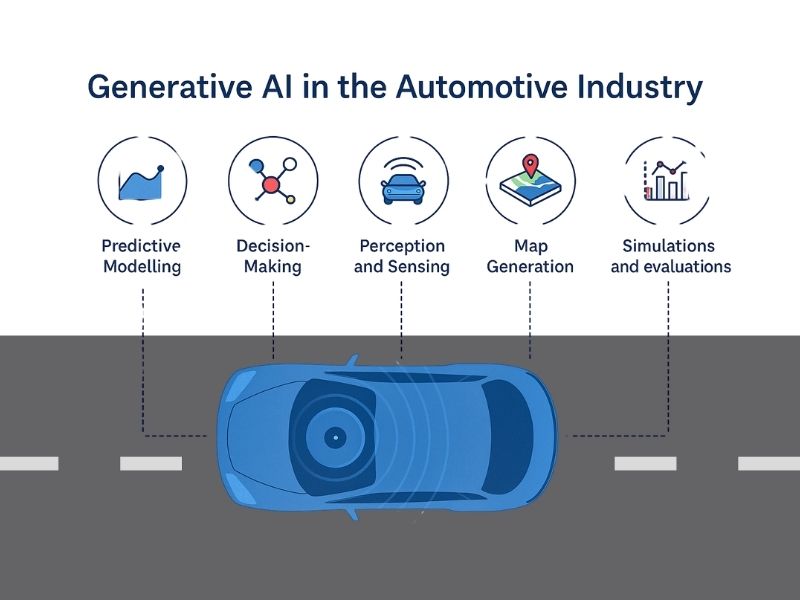How Generative AI Is Driving the Future of the UK Automotive Industry
From production lines to personalised customer journeys, generative AI is transforming the way the automotive industry works, and the shift is only accelerating.
When most people think of artificial intelligence (AI) in the automotive world, images of robot arms on factory floors or fully autonomous vehicles often come to mind. But in 2025, the real game-changer isn’t self-driving tech, it’s generative AI.
Unlike traditional AI, which focuses on automating repetitive tasks, generative AI can create new content, solve complex problems, and even simulate design ideas in real time. It writes, codes, designs, analyses, and it’s already reshaping how the UK automotive sector operates, communicates, and connects with customers.
TL DR – What This Blog Covers:
- Generative AI is reshaping the UK automotive industry, beyond self-driving tech, it's now driving innovation in design, marketing, customer service, and operations.
- Market Momentum: The UK automotive AI market is forecast to grow from $474.7M in 2023 to $2.2B by 2030, with a 24.6% annual growth rate.
- Widespread Adoption: Over 87% of automotive companies are actively using or piloting generative AI to gain efficiency and stay competitive.
- Real-World Benefits: From cutting vehicle discovery time by 30% to delivering real-time 24/7 customer support, AI is reducing costs, accelerating processes, and boosting engagement.
- Strategic Opportunity: Businesses that adopt generative AI now can gain an edge in personalisation, agility, and digital transformation, before it becomes standard industry practice.
A Shift from Tool to Co-Pilot
In recent years, generative AI has evolved from a helpful tool to a strategic co-pilot for automotive businesses. Manufacturers are now using it to accelerate global vehicle launches, break down language barriers between regions, and streamline collaboration across international teams.
This is more than a back-office revolution, it’s changing how the industry engages with drivers, prospects, and customers at every stage of the journey
Real-World Impact Across the Automotive Value Chain
Here in the UK, generative AI is no longer confined to research labs. It’s delivering tangible value in day-to-day operations:
- Design & Prototyping: Rapid ideation and iteration for new models
- Marketing: Highly personalised campaigns driven by real-time insights
- Customer Support: AI-powered agents that provide human-like responses 24/7
- Operations: Smart automation of internal workflows and data analysis
These innovations are already helping brands cut costs, move faster, and create more relevant experiences, all while staying competitive in a changing market
A New Era for Automotive
The shift is being fuelled by major investments, OEM–tech partnerships, and a shared need for scalable, intelligent tools. Generative AI isn’t just enhancing what exists, it’s unlocking entirely new possibilities.
Whether you’re designing your next EV, streamlining how customers book test drives, or creating smarter mobility platforms, generative AI is quickly becoming a foundational layer.

From Design Studio to Dealership: What Generative AI Is Doing Today
Generative AI is revolutionising the automotive industry, branching into nearly every aspect of the business. Here’s an in-depth look at its most impactful applications as of 2025:
1. Design & Engineering
Generative AI is reshaping automotive design by streamlining development and fostering innovation. It empowers engineers to create concept models, simulate components, and explore groundbreaking designs with greater efficiency and fewer errors.
For instance, Jaguar Land Rover (JLR) has adopted generative AI to automate the prototyping of electric vehicle components, reducing design time by an impressive 30%. This accelerated process allows for quicker rollouts of new electric models. Meanwhile, tools like Autodesk Generative Design are being utilised to produce optimised car parts that are lighter yet more durable, enhancing vehicle performance.
This fusion of speed and precision is invaluable as UK manufacturers navigate fierce competition and face urgent deadlines for electric vehicle development, ensuring they remain at the forefront of an evolving market.
2. Marketing & Customer Communication
Personalisation at scale has evolved from being a “nice-to-have” to an essential component of automotive marketing. Generative AI is changing how brands engage with customers, enabling the creation of tailored content across multiple channels. From emails and advertisements to social media posts, AI-generated content allows brands to craft messages that resonate with diverse audiences.
For instance, UK dealership groups like Lookers are leveraging AI to produce dynamic, personalised vehicle brochures, leading to a 20% increase in lead conversion rates. Moreover, advanced image generation tools let customers visualise their custom vehicle configurations, elevating their purchasing experience. By delivering hyper-personalised content, generative AI not only enhances the customer journey but also fosters trust and deeper engagement between brands and their audiences.
3. Virtual Product Advisors & Configurators
Today's car buyers demand seamless, digital-first experiences, and generative AI is revolutionising the car-buying journey with conversational and interactive tools. Picture a ChatGPT-style advisor integrated into a dealership's website, this virtual assistant can simplify complex tasks like explaining financing options, configuring car models, and comparing features, all in clear, accessible language.
A standout example is Nissan UK, which has embraced generative AI-powered virtual assistants, resulting in a 25% boost in customer satisfaction. Additionally, AI-driven platforms now allow customers to visually design and customise their dream cars, making online car shopping more engaging and personalised than ever before.
4. After-sales Support & Documentation
The era of flipping through bulky manuals is over. Generative AI has a significant impact on the after-sales service, making support more accessible and user-friendly than ever. Traditional service manuals are being replaced with conversational, voice-guided instructions, simplifying tasks like DIY diagnostics and at-home EV charging. Tools like ChatGPT and Grok empower users to troubleshoot minor issues with natural, easy-to-understand responses. These innovations not only elevate the customer experience but also streamline operations for dealerships and manufacturers, setting a new standard for efficiency and convenience.
5. Internal Operations & Productivity Tools
Generative AI is streamlining routine tasks and empowering employees with actionable insights. Tools like large language models (LLMs) are being used to summarise internal meetings, draft service bulletins, and create employee training materials. Dealerships in the UK are also adopting generative AI to collate and summarise conversations with leads, allowing staff to focus on higher-value tasks. By taking over mundane processes, generative AI enables teams to concentrate on innovation and building stronger customer relationships.
The UK Companies Driving Generative AI Innovation
The UK automotive industry is embracing generative AI, showcasing its transformative potential across various business functions. Here are some standout examples of companies leading the charge:
- Jaguar Land Rover (JLR) is pushing innovation boundaries by employing generative AI in its electric vehicle (EV) design process. With AI-powered tools, JLR has reduced prototyping time by nearly a third, accelerating the development of cutting-edge EV's without compromising quality standards.
- Nissan UK has elevated customer engagement through AI-driven virtual assistants. These intelligent systems handle inquiries and deliver personalised support, streamlining the customer experience and significantly boosting satisfaction, fostering stronger customer relationships.
- Arrival, a UK-based mobility startup, is revolutionising vehicle design with generative AI. This approach has enabled the company to lower manufacturing costs by an impressive 15%, paving the way for more affordable and accessible sustainable transportation solutions.
- Lookers, one of the UK’s leading dealership groups, is leveraging AI-generated marketing strategies to great effect. By analysing customer behaviour and preferences, Lookers has created highly targeted campaigns, achieving a 20% increase in lead conversion rates and driving both sales growth and customer loyalty.
These pioneering companies demonstrate the profound impact generative AI is having on the UK automotive sector. From design and manufacturing to customer service and marketing, AI is not just a trend, it’s a game-changing force reshaping the future of the industry.
Benefits at a Glance
The integration of generative AI into the UK automotive industry is driving transformative change, revolutionising operations and enhancing customer interactions. Here’s how:
- Personalized Customer Experiences: Generative AI enables highly tailored marketing strategies and sales interactions, creating experiences that deeply resonate with individual customers. From personalised vehicle recommendations to customisable features, this technology elevates the car-buying journey to a new level.
- Efficiency in Cost and Time: By automating complex processes like vehicle design, production workflows, and customer service, generative AI significantly reduces costs and accelerates timelines. This newfound efficiency allows businesses to reallocate resources strategically while maintaining exceptional quality.
- Enhanced Customer Satisfaction: AI-driven solutions, including virtual assistants and automated support systems, provide faster response times, seamless issue resolution, and stronger engagement throughout the entire buyer and ownership experience.
- Empowered Workforce: Rather than replacing human teams, generative AI enhances their potential. By automating routine tasks, it frees employees to focus on higher-value, innovative activities, boosting productivity and fostering innovation across the board.
Generative AI is more than just a tool for operational efficiency; it’s transforming the automotive industry by delivering smarter, customer-centric experiences while streamlining internal processes. The result? A future where businesses thrive, employees excel, and customers enjoy unparalleled satisfaction.

Get the free whitepaper: Unlocking the Future of Vehicle Discovery with Agentic AI
The Roadblocks and Reality Checks
The potential of generative AI is vast, but its integration into existing systems presents significant challenges that businesses must address with care. One major hurdle is data quality and outdated infrastructure. Many organisations still rely on legacy systems that struggle to integrate seamlessly with advanced AI tools. Poor-quality data can hinder AI performance, leading to unreliable outputs and reduced efficiency.
Accuracy is another critical concern. While generative AI is incredibly powerful, it is not infallible and can produce errors or "hallucinations," generating incorrect or nonsensical information. This issue becomes especially problematic in technical or domain-specific contexts where precision is vital, potentially resulting in misinformation or customer dissatisfaction.
Trust and transparency also pose significant obstacles. Although AI tools can deliver faster responses and streamline operations, many customers still prefer human interaction, associating it with empathy and reliability. To build trust in AI, businesses must be transparent about its usage and ensure the technology enhances, rather than replaces, human support.
Regulatory challenges further complicate implementation. Countries like the UK have introduced AI governance frameworks requiring transparency and accountability. These regulations, while designed to protect consumers, can make adoption more complex, particularly for businesses operating across multiple regions with varying compliance standards.
Successfully leveraging generative AI requires a thoughtful approach. Companies must strike a balance between innovation, customer expectations, and regulatory obligations to unlock the full potential of this transformative technology.
What’s Next for Generative AI in UK Automotive?
By 2026–2027, automakers can anticipate a wave of transformative AI solutions set to reshape operations and redefine the customer experience. AI-powered in-car assistants will evolve far beyond basic voice commands, providing real-time responses to driver needs, recommending proactive services, and personalising the driving experience by learning user preferences over time.
In marketing, generative AI will revolutionise campaigns, enabling brands to design fully AI-driven advertisements and create hyper-personalised content at scale. These campaigns will target specific audiences with unprecedented precision, adapting in real time to maximise performance.
Global vehicle launches will also become more seamless, thanks to real-time AI translation tools that break down language barriers. These innovations will facilitate clear, instant communication between automakers, dealers, and customers across different regions, paving the way for stronger global connections.
Automotive brands that embrace AI not just as a tool but as a creative collaborator will secure their place as industry pioneers. By integrating human ingenuity with AI’s potential, companies can unlock unparalleled levels of creativity, efficiency, and innovation, setting bold new standards in the fast-changing automotive landscape
Driving Forward with Generative AI
Generative AI has moved beyond being a buzzword, it’s now a transformative force reshaping the automotive industry at every level. From design and manufacturing to sales and customer service, this technology is driving innovation, boosting efficiency, and delivering tangible results. In the UK, businesses aren’t just experimenting with it, they’re leveraging it to accelerate EV production, optimise supply chains, and create personalised customer experiences that foster loyalty.
What makes generative AI so powerful is its ability to complement, not replace, human creativity and intuition. It enhances the personal touch, working alongside professionals to unlock new opportunities, simplify complex processes, and enable faster, smarter decision-making. For automotive professionals, the time to embrace this technology is now. Generative AI can revolutionise customer engagement through advanced personalisation, increase productivity on production lines, and inspire groundbreaking innovation
93% of automotive industry stakeholders believe generative AI is a game-changer, with 75% planning to adopt it within the year. - PYMNTS
Generative AI is now powering the next wave of automotive innovation. From intelligent chatbots addressing customer queries in seconds to data-driven personalised buying experiences, AI has the potential to meet, and even exceed, customer expectations. But success requires more than just adopting new tools. It demands a strategy focused on creating seamless, meaningful, and frictionless experiences for every customer.
Are you interested in learning how Tomorrow's Journey is building cutting-edge tools to take Generative AI to the next level in the automotive industry? Get in touch with us today to discover how we can help drive innovation and transform customer experiences in this exciting era of AI-powered solutions.
Explore Our Latest Insights
Discover trends and innovations in the automotive sector.








